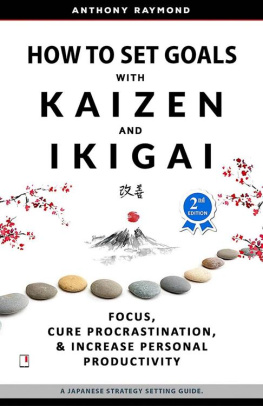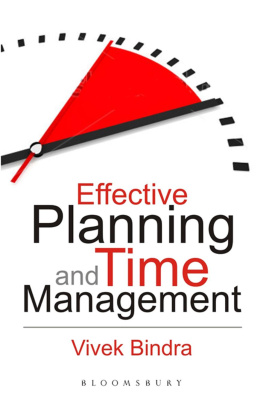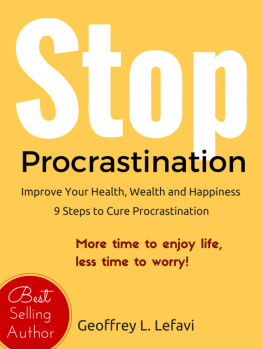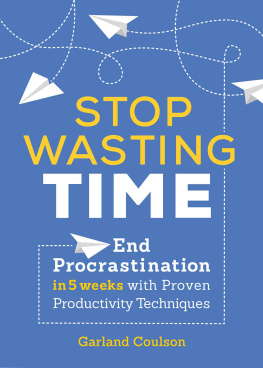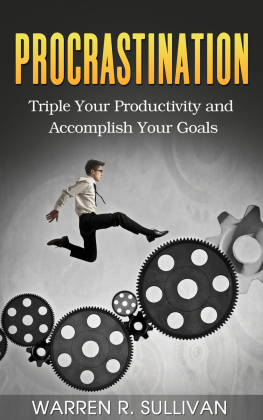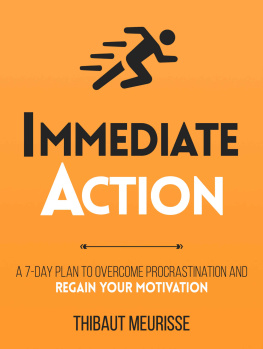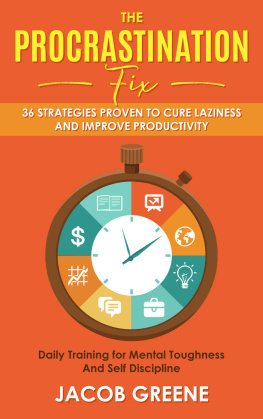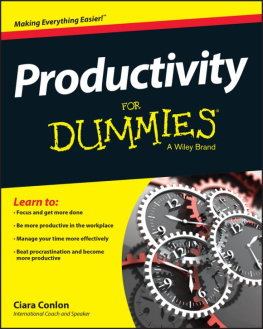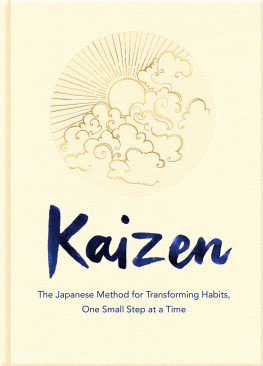Anthony Raymond - How to Set Goals with Kaizen & Ikigai: Focus, Cure Procrastination, & Increase Personal Productivity.
Here you can read online Anthony Raymond - How to Set Goals with Kaizen & Ikigai: Focus, Cure Procrastination, & Increase Personal Productivity. full text of the book (entire story) in english for free. Download pdf and epub, get meaning, cover and reviews about this ebook. year: 2019, genre: Religion. Description of the work, (preface) as well as reviews are available. Best literature library LitArk.com created for fans of good reading and offers a wide selection of genres:
Romance novel
Science fiction
Adventure
Detective
Science
History
Home and family
Prose
Art
Politics
Computer
Non-fiction
Religion
Business
Children
Humor
Choose a favorite category and find really read worthwhile books. Enjoy immersion in the world of imagination, feel the emotions of the characters or learn something new for yourself, make an fascinating discovery.
- Book:How to Set Goals with Kaizen & Ikigai: Focus, Cure Procrastination, & Increase Personal Productivity.
- Author:
- Genre:
- Year:2019
- Rating:5 / 5
- Favourites:Add to favourites
- Your mark:
- 100
- 1
- 2
- 3
- 4
- 5
How to Set Goals with Kaizen & Ikigai: Focus, Cure Procrastination, & Increase Personal Productivity.: summary, description and annotation
We offer to read an annotation, description, summary or preface (depends on what the author of the book "How to Set Goals with Kaizen & Ikigai: Focus, Cure Procrastination, & Increase Personal Productivity." wrote himself). If you haven't found the necessary information about the book — write in the comments, we will try to find it.
Anthony Raymond: author's other books
Who wrote How to Set Goals with Kaizen & Ikigai: Focus, Cure Procrastination, & Increase Personal Productivity.? Find out the surname, the name of the author of the book and a list of all author's works by series.
How to Set Goals with Kaizen & Ikigai: Focus, Cure Procrastination, & Increase Personal Productivity. — read online for free the complete book (whole text) full work
Below is the text of the book, divided by pages. System saving the place of the last page read, allows you to conveniently read the book "How to Set Goals with Kaizen & Ikigai: Focus, Cure Procrastination, & Increase Personal Productivity." online for free, without having to search again every time where you left off. Put a bookmark, and you can go to the page where you finished reading at any time.
Font size:
Interval:
Bookmark:
Copyright 2021 by Anthony Raymond
www.AnthonyRaymond.org
All rights reserved. This book is copyright protected. You cannot amend, distribute, sell, use, or paraphrase any part of the content within this bookexcept for brief quotations in critical reviews or articleswithout the consent of the author or publisher.
This book is not intended as a substitute for medical advice of physicians. Before starting any dietary regimen you should consult a physician. No warranties of any kind are declared or implied. Readers acknowledged that the author is not engaged in the rendering of legal, financial, or professional advice. Consult a licensed professional if health, financial, or legal expert services are needed.
v.: 1.0133

This book is dedicated to my ever-energetic mother.
CONTENT S
Get the Worksheet
Anthony here. Id just like to say thanks for checking out my book! Also, Ive created a little companion worksheet to help put your life goals into perspective and discover your personal Ikigai (your true calling). Well be using this worksheet in Chapter 3. But download it now so youll be ready.
If youre reading this book on a Kindle or iPad, you can click the link below to get it. Or, paperback readers can type the link into your iPhone or PC.

www.AnthonyRaymond.org/gift
From time to time, you may find yourself struggling to complete a life goal. It might be a college entrance exam, a new business startup, a fitness regimen, or perhaps even a mission to find someone to marry. While personal objectives vary widely, every one of us (each nobleman, king, pauper, and pleb) has been assigned a nonnegotiable imperative:
You must set and accomplish new goals (of one form or another) each and every day, until the day you die.
To be human means to be a contestant in an interminable hurdle race. When you awake each morning, the race begins. After you stumble out of bed and rub your sleepy eyes, the first objective of the day will be quick to reveal itself to you.
Whats on your to-do list this morning?
- Is this your first day of school?
- The day of your childs birth?
- The start of a new career?
- Will you be landing a spacecraft on Mars?
- Is this your wedding day?
- Or, perhaps today you intend to do nothing more than drink beer and watch cat videos on YouTube.
Though the size and complexity of your goals will vary throughout your life, the necessity to set new goals will persist. There will never be a day when you find yourself without a goal (of some size) to complete. Lifes marathon calls upon us to jog up a perpetual incline. The race features many hurdles, grueling sprints, and occasional checkpoints at which youll be allowed a temporary respitea moment to catch your breath and exchange a few high-fives before proceeding down the road. As the American author David Deida wrote:
Every moment of your life is either a test or a celebration.

Hence, becoming proficient at the art of goal-setting is in the interest of us all.
But, if this is true, then why are we all so bad at it?
- Why do we fail to accomplish our goals so often?
- Why is it so difficult to stick to a course of action, even when we know it would be in our best interest to do so?
Curiously, most of us already possess the physical and mental abilities required to accomplish impressive life goals. Think of it this way, if a mad scientist held a gun to your head and forced you to jog five miles on a treadmill each evening after work, you could probably do it. Alternatively, if you were locked in a cell with your biology textbook and told that you would be released and given one million dollars if you aced your next exam, then you could probably do that too.
So, why dont you?
If youre convinced that its in your interest to implement a nightly workout regimen or study for tomorrows test, then why cant you just do the work without a gun-toting psychopath looming behind you?
Usually, such failures are not the result of a lack of intelligence or stamina. Instead, we lack the conviction and willpower necessary to see a long-term goal to its completion. Unfortunately, we humans often find it difficult to engage in the self-directed pursuit of a lengthy project when there are no external drivers prodding us to action. Life goals often call upon us to pledge a daily commitment to mentally or physically strenuous activities. But, inactivity is the default state of man.
When our bodies are comfortable, well-fed, and safe, then our lower mind (aka our lizard brain, reptilian complex, or limbic system) would prefer to remain inactive. While our conscious mind is aware of next weeks looming deadline, our lower mind thinks that next week is a million years away; it lives in the here and now , the future is an abstract concept that doesnt require any immediate attention.
When you call upon your lower mind to spend three hours attending to something called a biology textbook it will invoke various emotional states (like fatigue, boredom, procrastination, or despair) in an effort to prevent you from executing such a bothersome and energy-consuming task. Your lower mind would prefer to not exchange its precious energy for a few tidbits of information about frog intestinesespecially when the only reward for this exertion is a piece of paper with a red A written on it. As the adage goes:
Your brain exists to help you survive, not to thrive.
Our mind often seems to be pursuing two contrary sets of goals. The activities that we should be doing are often not the activities that the lower mind necessarily enjoys doing.

While your conscious mind may genuinely want to engage in industrious pursuits and climb the mountain of self-actualization, your lower mind often doesnt want to come along for the ride.
- Is there any way to harmonize such divergent imperatives?
- What can we do to convince our brain to stay the course; to focus its energies on the pursuit of constructive life goals rather than carnal desires?
The answer to these questions lies in first recognizing the difference between intrinsic and extrinsic motivation. If someone requires you to do something (like run at gunpoint) then you are subject to an extrinsic motivatorcompelled to action due to external forces of reward or punishment. On the other hand, when it comes to intrinsic motivation , ones actions are driven by internal desireperhaps spurred on by the pursuit of mastery, the thrill of physical exertion, or the satisfaction of completing a beneficial objective.
- Wouldnt life be easier if there was some way to trick your mind into becoming intrinsically motivated, instead of having to rely on external driverslike a boss, a parent, or a teacher?
- What if you could learn to spot the triggers and mental traps that cause you to procrastinate, put things off, or halt your forward progress?
- What if you could change the way you perceive your life goals? And learn to break objectives down into their smaller constituentssuch that each incremental step toward the goalpost seemed more manageable?
Font size:
Interval:
Bookmark:
Similar books «How to Set Goals with Kaizen & Ikigai: Focus, Cure Procrastination, & Increase Personal Productivity.»
Look at similar books to How to Set Goals with Kaizen & Ikigai: Focus, Cure Procrastination, & Increase Personal Productivity.. We have selected literature similar in name and meaning in the hope of providing readers with more options to find new, interesting, not yet read works.
Discussion, reviews of the book How to Set Goals with Kaizen & Ikigai: Focus, Cure Procrastination, & Increase Personal Productivity. and just readers' own opinions. Leave your comments, write what you think about the work, its meaning or the main characters. Specify what exactly you liked and what you didn't like, and why you think so.

